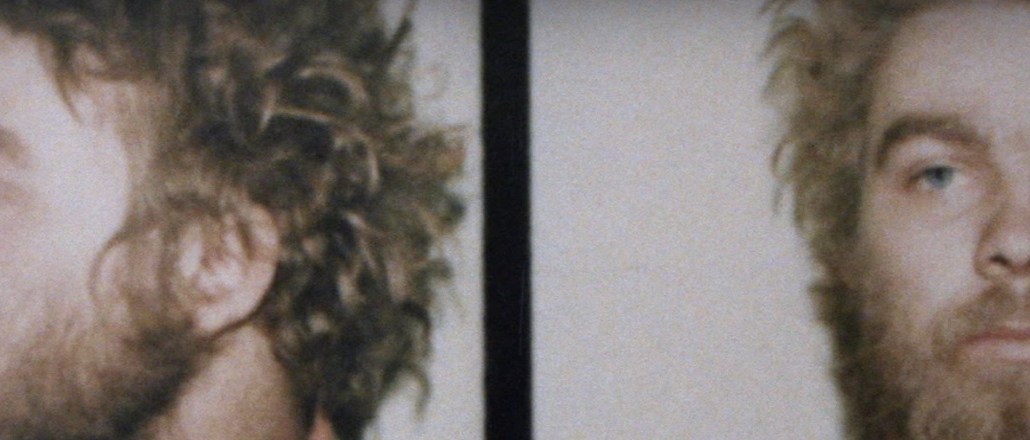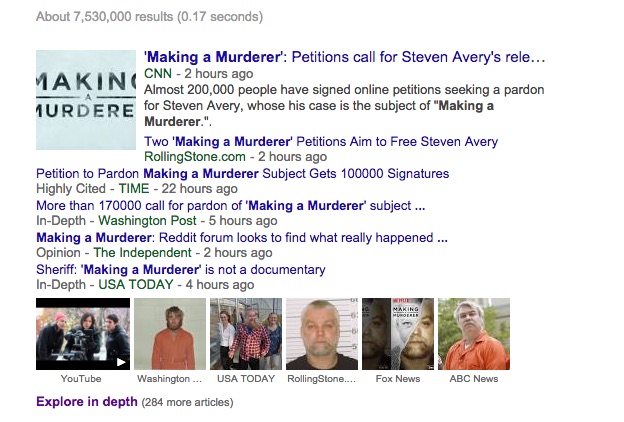Save 50% on a 3-month Digiday+ membership. Ends Dec 5.

The Netflix original “Making a Murderer” has proven to be the best gift of them all this Christmas.
The 10-episode crime documentary examines whether Steven Avery murdered a young photographer named Teresa Halbach in 2005 — or if he was framed by the police days before he was set to receive a massive settlement for being wrongly imprisoned for a previous crime years earlier.
While the premise sounds like a typical episode of “Dateline” or “Forensic Files,” “Making a Murderer” is anything but.
Each one-hour episode leans on candid interviews from Avery’s family and lawyers shot over the past decade and gripping courtroom testimony, all woven together with clips from local news in Wisconsin and stylish explainer graphics. Also, lots of sweeping overhead footage of the bucolic countryside.
“Making a Murderer” debuted on Dec. 18, following the success of recent true crime series including the “Serial” podcast and “The Jinx” on HBO. While Netflix doesn’t reveal ratings, the buzz — along with heaps of praise — generated online makes it a “hit” for the streaming service to some degree.
Here’s how it garnered the Internet’s attention:
Ad position: web_incontent_pos1
Applause and acclaim from critics.
Making a Murderer started off strong on Rotten Tomatoes, measuring a 96 percent from critics. The series was showered in praise with adjectives like “riveting,” “addicting” and “shockingly disturbing.” “The series repeatedly brings you to the edge of your seat and holds you there, eyes glued to the screen,” a TV Guide critic wrote.
If that doesn’t entice you dip into a series like this during one of the years’ slowest times, then nothing will.
People can’t stop talking about it.
With a heavy focus on injustice and unfair treatment toward Avery, the series sets its self up to be dissected and discussed on social media. Brandwatch tells Digiday that it’s been mentioned 130,000 times online since its debut, peaking on the day after Christmas. Of the mentions, 57 percent of them are positive with the negative mentions focusing on “people’s disbelief and outrage” of what’s happening in the series.

That energy appears to be coalescing around two petitions calling for reexamination of the case, both garnering a combined 200,000 signatures.
Ad position: web_incontent_pos2
Publishers can’t either.
Making a Murderer was a big gift for writers who had to work the dead week between Christmas and New Years. Publications have written about it 1,900 times. Dec. 29 was the day it was written about the most, with 430 mentions. It’s unclear how many of those were “thinkpieces” filled with “hot takes” but we’re going to guess a lot of them:

Of course there are memes and hashtags.
Besides people using the title as a hashtag, the most popular is #FreeStevenAvery, which was seen by Twitter users 2.3 million times. As for the title, #MakingaMurderer was used in 26,000 tweets collecting 415 million impressions.
Avery’s compassionate lawyers, Dean Strang and Jerome “Jerry” Buting, also attracted a subculture of stardom on Twitter, even warranting their own Twitter Moment along with “fan art” and memes:
Perfectly states my feelings: pic.twitter.com/kN9JWuj7md
— dax shepard (@daxshepard1) January 3, 2016
In which @TotesChris and @MichelleLiTV tell Dean Strang about the ladies who <3 him https://t.co/6MZBSgOQiu pic.twitter.com/doN8ECoXQg — Jessie Opoien (@jessieopie) January 4, 2016
Dean Strang and Jerome Buting are straight up ballers. #MakingAMurderer (via @kbriquelet ) pic.twitter.com/J91ffQRg3G
— Modhabobo (@Modhabobo) December 31, 2015
In all, the series captured the Internet zeitgeist in a way that many documentaries wish they could.
More in Marketing

Ulta, Best Buy and Adidas dominate AI holiday shopping mentions
The brands that are seeing the biggest boost from this shift in consumer behavior are some of the biggest retailers.

U.K. retailer Boots leads brand efforts to invest in ad creative’s data layer
For media dollars to make an impact, brands need ad creative that actually hits. More CMOs are investing in pre- and post-flight measurement.
Ad position: web_bfu